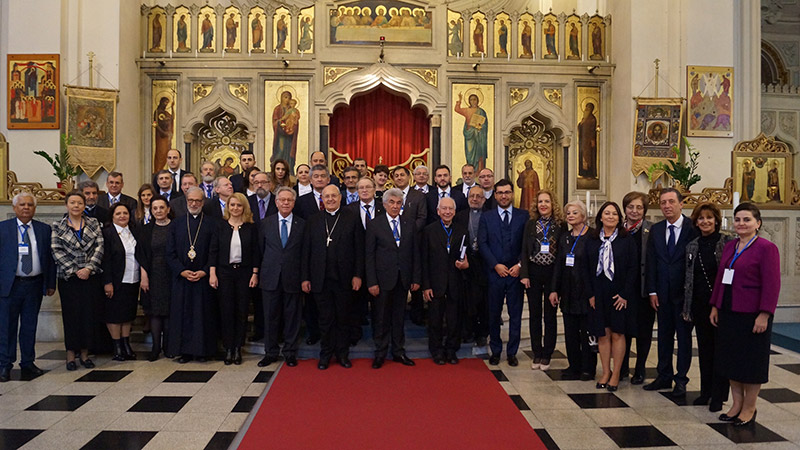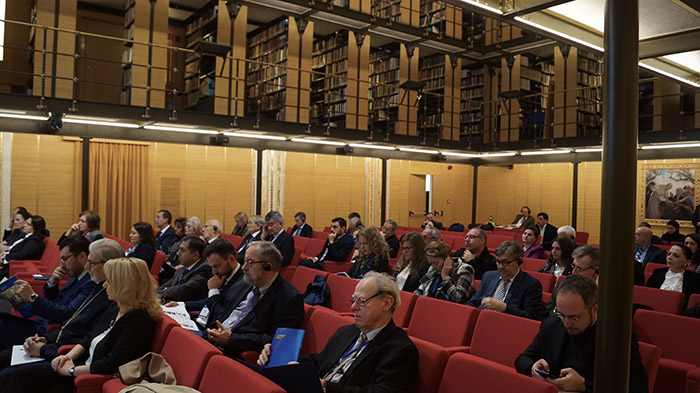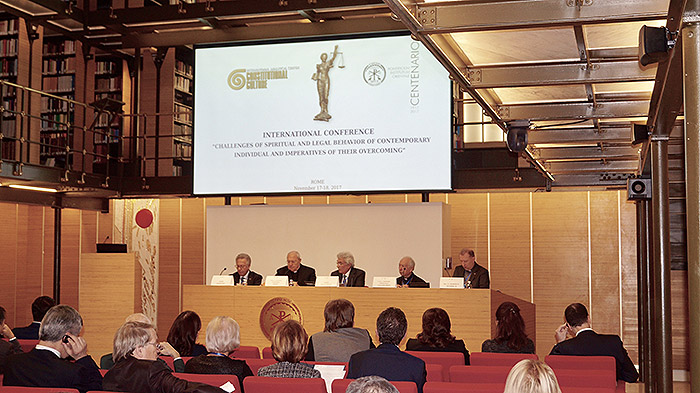
INTERNATIONAL CONFERENCE IN ROME
On November 17-18, the International Conference on “Challenges of Spiritual and Legal Behavior of Contemporary Individual and Imperatives of their Overcoming” was organized in the Great Hall of the Pontifical Oriental Institute of Rome, by “The Constitutional Culture” International Analytical Centre and “The Center of the Constitutional Law of the Republic of Armenia”, in association with the Pontifical Oriental Institute of the Holy See. The Conference was attended by the delegations of the Constitutional Courts of a number of countries, senior officials of the Holy See, well-known constitutionalists from Austria, Hungary, Russia, Slovenia, Georgia, Macedonia, Serbia, Ireland, Iceland, Italy, France and Tajikistan.
H.E. Prof. GagikHarutyunyan, the President of the Constitutional Court of the Republic of Armenia, the President of the Board of Trustees of “The Constitutional Culture” International Analytical Centre, and Rev. Fr. David Nazar SJ, the Rector of the Pontifical Oriental Institute delivered welcoming addresses. The opening speeches were made by H.E. Mr. Gianni Buquicchio, the President of the Venice Commission of the Council of Europe, H. Em. Cardinal Leonardo Sandri, the Prefect of the Congregation for the Oriental Churches, H. Em. Cardinal Francesco Coccopalmerio, the President of the Pontifical Council for Legislative Texts, Rev. Fr. Georges H. Ruyssen, SJ, the Dean of the Faculty of Canon Law of the Pontifical Oriental Institute.
At I Plenary Session (Chair: Prof. Andras Sajo, the Central European University, the former Vice-President of the European Court of Human Rights) the following presentations were made: “Imperatives of Constitutionalization of Social and Legal Behavior of Human Being” by Prof. Gagik Harutyunyan, the President of the Constitutional Court of the Republic of Armenia, the President of the Board of Trustees of “The Constitutional Culture” International Analytical Centre, “The Value of the Individual in Contemporary Constitutional Culture and the Ethico-Legal Challenges of Biomedicine” by Dr. Ann Power-Forde, the Presiding Constitutional Court Judge Kosovo Specialist Chambers, the former Judge of the European Court of Human Rights, “Legal Subjectivity of Nasciturus and His Right to Life” by Dr. Boštjan M. Zupancic, LL.M., S.J.D. (Harv.), the Professor of Law, the former Judge of the European Court of Human Rights, “Human Dignity and the Right to Life” by Prof. Robert Spano, the Judge and President of Section of the European Court of Human Rights. The topics covered in the presentations were discussed at questions and answers session.
At II Plenary Session (Chair: Prof. Gagik Harutyunyan, the President of the Constitutional Court of the Republic of Armenia, the President of the Board of Trustees of “The Constitutional Culture” International Analytical Center) the following presentations were made: “Current Challenges to the Spiritual Character of a Modern Individual: the Role of State and Church in their Overcoming” by Archbishop Yeznik Petrosyan, the Mother See of Holy Etchmiadzin, the General Secretary of the Bible Society of Armenia, “Solidarity in Contemporary Constitutional Thought” by Prof. Andras Sajo, the Central European University, the former Vice-President of the European Court of Human Rights, “Dialectics between Value and Values: A Philosophical Perspective on Historical Evolution and Contemporary Problems” by H.G. Levon Zekiyan, the Archieparch of Catholic Armenians of Istanbul and Turkey, Professor at the Pontifical Oriental Institute.
The topics covered in the presentations were discussed at questions and answers session.
At III Plenary Session (Chair: Ms. Vesna Ilic-Prelic, the President of the Constitutional Court of Serbia) the following presentations were made: “From Constitutional Objective to Constitutional Imperative. A Сase Study of Abolition of Capital Punishment by Judicial Review” by Prof. Bakhtiyar Tuzmukhamedov, the Vice-President of the Russian Association of International Law, Member-elect of the Committee Against Torture, Judge (retired) of the Appeals Chamber of the UN International Criminal Tribunals for Rwanda and for the former Yugoslavia, “A Sacred Book of Constitution: Values, Ideals and Rights in a Post-Soviet Reality” by Prof. KonstantineVardzelashvili, Ilia State University Law School, the Former Vice-Chair of the Constitutional Court of Georgia, the Former Member of the UN Human Rights Committee.
The topics covered in the presentations were discussed at questions and answers session.
At IV Plenary Session (Chair: Dr. Boštjan M. Zupancic, LL.M., S.J.D. (Harv.), Professor of Law, the former Judge of the European Court of Human Rights) the following presentations were made: “The Constitutional Culture “Enlightenment approach” in the “Post-Secular age” - A Few Contemporary Balkans Insights” by Prof. Tanja Karakamisheva-Jovanovska, PhD, the Member of the Venice Commission and full time Constitutional law Professor at the Faculty of Law “Iustinianus Primus” Skopje, Republic of Macedonia, “Legal Implementation of Ethno-Religious Values in the Constitutional Development of States” by Dr. Aleksei Liverovskii, Professor, the Scientific Director of the Faculty of Law of St. Petersburg State University of Economics (UNECON), Head of the Department of Constitutional Law.
News
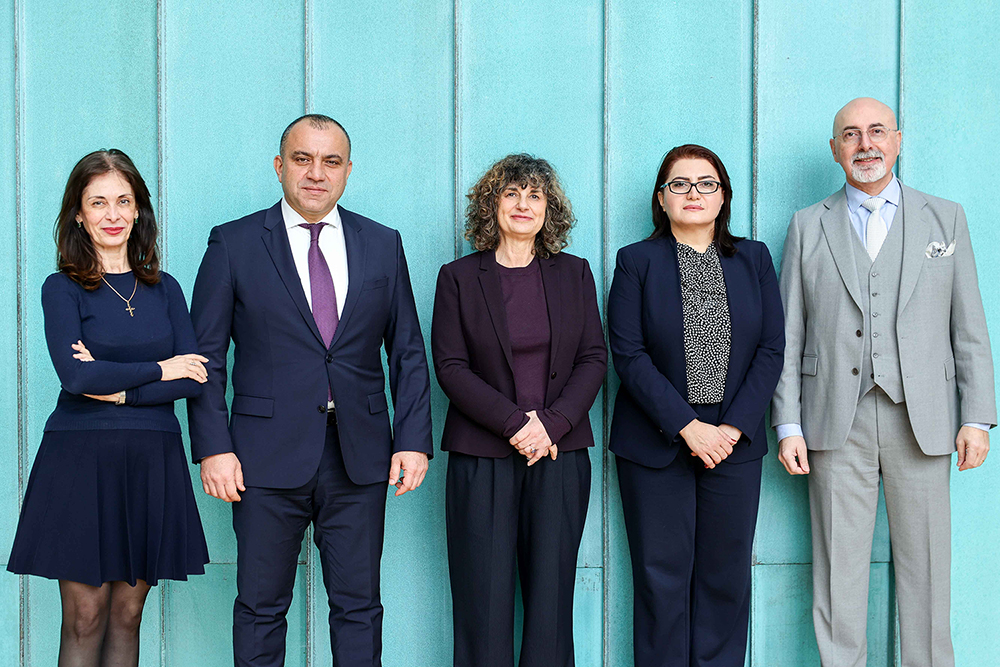
3 February 2026
THE PRESIDENT OF THE CONSTITUTIONAL COURT OF THE REPUBLIC OF ARMENIA MET WITH THE DIRECTOR OF HUMAN RIGHTS OF THE COUNCIL OF EUROPE
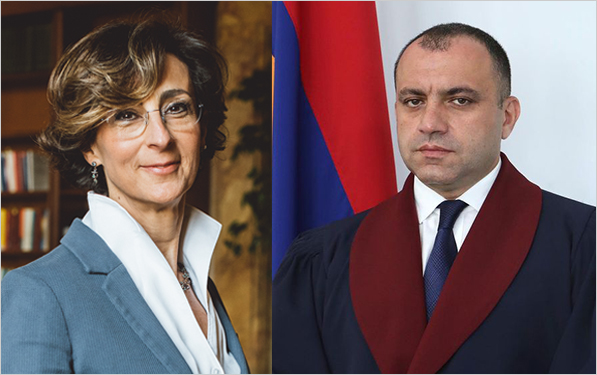
3 February 2026
THE PRESIDENT OF THE CONSTITUTIONAL COURT OF THE REPUBLIC OF ARMENIA MET WITH THE PRESIDENT OF THE VENICE COMMISSION
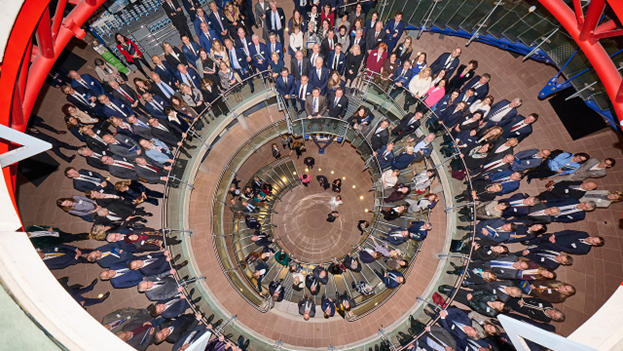
2 February 2026
THE PRESIDENT OF THE CONSTITUTIONAL COURT PARTICIPATED IN THE OPENING OF THE JUDICIAL YEAR OF THE EUROPEAN COURT OF HUMAN RIGHTS IN STRASBOURG
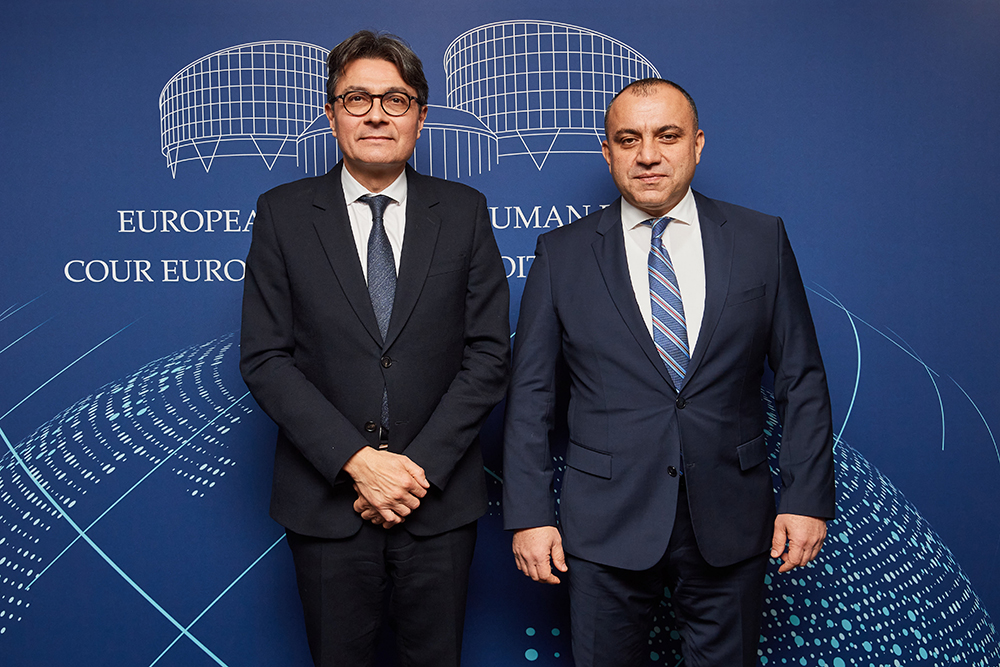
2 February 2026
MEETING OF THE PRESIDENT OF THE CONSTITUTIONAL COURT OF THE REPUBLIC OF ARMENIA AND THE PRESIDENT OF THE EUROPEAN COURT OF HUMAN RIGHTS IN STRASBOURG

20 January 2026
THE ROLE OF STATE AUTHORITIES AND CIVIL SOCIETY IN THE IMPLEMENTATION OF THE DECISIONS OF THE CONSTITUTIONAL COURT

The website of the Constitutional Court of the Republic of Armenia has been created as part of the Partnership for Good Governance (PGG II) Project ''Support to the judicial reform – enhancing the independence and professionalism of the judiciary in Armenia'' co-funded by the European Union and the Council of Europe. The views expressed herein can in no way be taken to reflect the official opinion of either party.

The upgrade of the official website of the Constitutional Court of the Republic of Armenia is made possible by the support of the American People through the United States Agency for International Development (USAID) as a part of the USAID/Armenia Justice Sector Support Project. The content of this website is the sole responsibility of the Constitutional Court and does not necessarily reflect the views of USAID or the United States Government.





